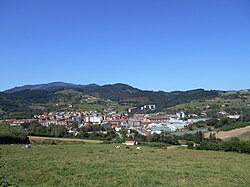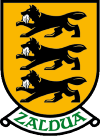Zaldibar
| Zaldibar | |||
|---|---|---|---|
| Municipality | |||

Zaldibar overview
|
|||
|
|||
 Location of Zaldibar in Biscay. |
|||
| Location in Spain | |||
| Coordinates: 43°10′21″N 2°32′43″W / 43.17250°N 2.54528°WCoordinates: 43°10′21″N 2°32′43″W / 43.17250°N 2.54528°W | |||
| Country |
|
||
| Autonomous community |
|
||
| Province | Biscay | ||
| Comarca | Durangaldea | ||
| Government | |||
| • Mayor | Arantza Baigorri (EH Bildu) | ||
| Area | |||
| • Total | 11,840 km2 (4,570 sq mi) | ||
| Elevation | 195,49 m (64,137 ft) | ||
| Population (2014) | |||
| • Total | 3,062 | ||
| • Density | 0.26/km2 (0.67/sq mi) | ||
| Demonym(s) | Zaldibartar | ||
| Time zone | CET (UTC+1) | ||
| • Summer (DST) | CEST (UTC+2) | ||
| Postal code | 48250 | ||
| Website | Official website | ||
Zaldibar (in Basque and officially, in Spanish: Zaldívar) is an elizate, town and municipality located in the province of Biscay, in the Basque Country, Spain. Zaldibar is part of the comarca of Durangaldea and has a population of 3,062 inhabitants as of 2014 and according to the Spanish National Statistics Institute.
Zaldibar can be translated from Basque as "horse valley", from zaldi (horse) and ibar (valley). The coat of arms of the town then includes a horse. Zaldívar is the name in Spanish. However, the town was named Zaldua (Basque) or Zaldúa (Spanish) until 1932. Zaldua is then translated from Basque to Spanish as "el soto", which might be referred to a sotobosque, Spanish word for understory. "Valley of the Soto" is then another possible origin of the current name.
Currently, Zaldua is considered an archaism and it is not used, being since 1980 Zaldibar the official name of the municipality.
The elizate of Zaldua, today Zaldibar, was part of the ancient merindad of Durango and had voice and right to vote in the Juntas of Guerendiaga, where it occupied the seat number seven. As it is common with the elizates, the original date of founding is unknown. The tradition tells that the Navarre king Sancho II of Pamplona (935-994) lived ten years in one of the towers of Zaldibar as a prisoner. The owners of the forementioned tower controlled several territories of what today is Zaldibar. There are historical data that places the construction of the San Andres church (the church of the town) in the 13th century. The church was reconstructed in 1778 from previous damage.
...
Wikipedia



